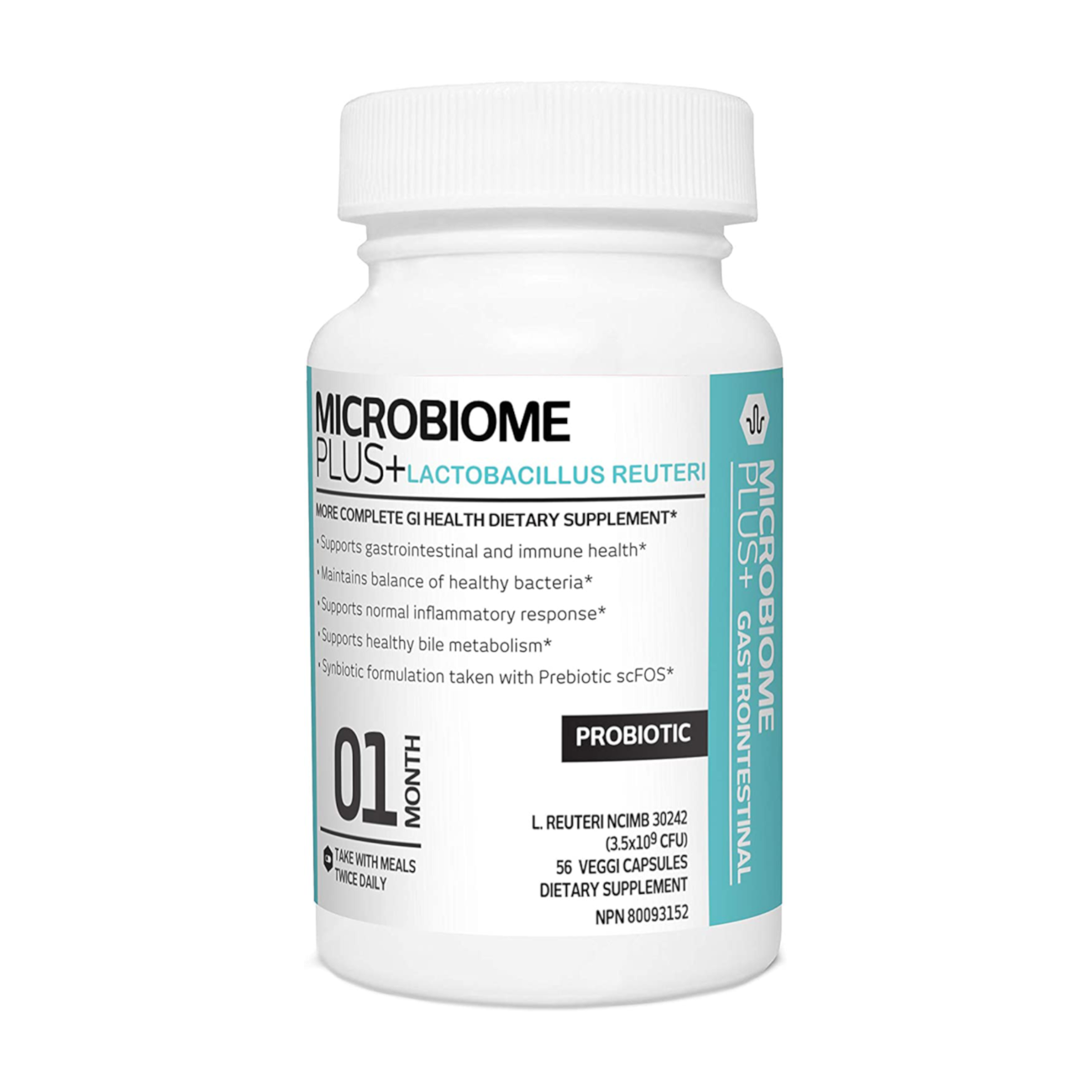What are vegan probiotics?
These are the probiotics that are free of animal products, fish, GMOs, soy, gluten, or harmful additives of any kind.
What are the benefits of consuming a Vegan Probiotic?
Being entirely vegan makes a probiotic allergy safe. Moreover, it could be an ideal option for the vegans who face a challenge fulfilling their probiotic needs with a food (like yogurt) or supplement carrying animal products.
The downside:
A majority of supplements on the market today fail to offer quality vegan probiotics. Their probiotic species may contain some amounts of dairy, which may not be suitable for people with milk allergies.
We’ve got you Covered!
The probiotics formulated by Microbiome Plus+ are free from and tested for all fillers or harmful additives.
- Essentially, they contain no dairy additives, no fish including bass, flounder, cod, shellfish, and zero nuts (no almonds, walnuts, peanuts, pecans). Being free of any dairy makes them favorable for people with lactose intolerance.
- Our vegan probiotic has absolutely no soybeans, wheat, celery, mustard, or any ingredient that could cause allergy.
- It does not contain sulfur dioxide or sulfites in concentrations above 10 mg/kg.
- It also lacks lupin, mollusks (like oysters and snails), or products thereof.
What are the Consequences of consuming a non-Vegan Probiotic?
A probiotic may be grown on a dairy or an unknown medium and contain harmful ingredients. When such a probiotic is ingested, an allergic reaction may ensue, which can take the following forms:
Atopy
Some individuals have a genetic propensity to develop immunoglobulin E (IgE) antibodies following exposure to an allergen (allergy-inducing agent). This property of producing IgE antibodies on exposure to an allergen is termed as atopy. A reaction that is out of proportion to the allergy-provoking stimulus incites allergy. Atopy, is, therefore, categorized as a type I hypersensitivity reaction in which certain types of immune cells coated with an IgE antibody and a cross-linking allergen do all the damage.
A person with atopy can also be allergic to the foods or food ingredients consumed. The end result could be inflammation usually manifested as rash, itching, hives, swelling of lips and face, vomiting, and diarrhea. In severe cases, anaphylactic shock can occur that may lead to death. For instance, in a person with an allergy to peanuts, ingesting even a tiny amount can be life-threatening.
Lactose Intolerance
Some children are deficient in lactase, an enzyme that breaks down lactose into its constituents. Consumption of dairy or any product-containing dairy can cause relentless diarrhea and malabsorption.
Celiac disease
Presence of wheat and gluten can be particularly detrimental to people with celiac disease, aggravating stomach issues.
Eosinophilic syndrome
Very rarely, allergens in some unknown probiotic brands can also trigger a serious condition called eosinophilic syndrome. [1] This condition is characterized by elevated blood eosinophils, blood cells indicative of an allergic reaction or disease. It induces widespread organ damage, including but not limited to the heart, brain, skin, and lungs.
Sulfite Oxidase deficiency
Some products may contain sulfites above 10 mg/kg, which are known to irritate the airways and cause wheezing and asthma-like symptoms from inhaling a few particles during the swallowing process. [2] This reaction is more common in asthmatics, probably due to the former presence of twitchy airways and the deficiency of sulfite oxidase, an enzyme that breaks down sulfite and sulfur-containing compounds.
Our Recommendations
We recommend people with known allergic diseases like asthma and eczema be tested for atopy and consult their physician before trying any new supplement.
Be sure to check the labeled ingredients line by line prior to taking a probiotic supplement.
Consuming a vegan probiotic like the one manufactured by Microbiome Plus+ ensures the prevention of food allergies. For information on the list of our allergy-safe vegan probiotic ingredients, visit https://microbiomeplus.com/allergen-statement/.
References
- Fabian A. Mendoza, Shivani Purohit, Lawrence Kenyon, and Sergio A. Jimenez, “Severe Eosinophilic Syndrome Associated with the Use of Probiotic Supplements: A New Entity?,” Case Reports in Rheumatology, vol. 2012, Article ID 934324, 3 pages, 2012. doi:10.1155/2012/934324.
- Vally H, Misso NL. Adverse reactions to the sulphite additives. Gastroenterology and Hepatology From Bed to Bench. 2012;5(1):16-23.










